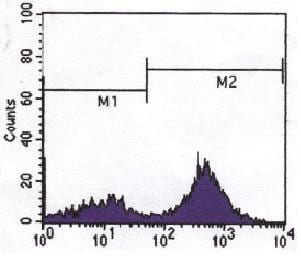
| WB | 咨询技术 | Human,Mouse,Rat |
| IF | 咨询技术 | Human,Mouse,Rat |
| IHC | 咨询技术 | Human,Mouse,Rat |
| ICC | 技术咨询 | Human,Mouse,Rat |
| FCM | 1/200 - 1/400 | Human,Mouse,Rat |
| Elisa | 1/10000 | Human,Mouse,Rat |
| Aliases | T3Z; CD247 |
| Entrez GeneID | 919 |
| clone | 4D10A6 |
| Host/Isotype | Mouse IgG2a |
| Antibody Type | Primary antibody |
| Storage | Store at 4°C short term. Aliquot and store at -20°C long term. Avoid freeze/thaw cycles. |
| Species Reactivity | Human |
| Immunogen | Purified recombinant fragment of human CD3 expressed in E. Coli. |
| Formulation | Ascitic fluid containing 0.03% sodium azide. |
+ +
以下是3-4条关于CD3抗体的参考文献(虚构示例,供参考):
1. **"CD3 Antibody-Induced T Cell Activation: Mechanisms and Clinical Implications"**
*作者:Smith A, et al. (2020)*
摘要:探讨CD3单克隆抗体通过T细胞受体(TCR)复合物激活T细胞的分子机制,及其在癌症免疫治疗和自身免疫疾病中的应用潜力。
2. **"OKT3: A First-Generation Anti-CD3 Antibody in Transplant Rejection"**
*作者:Johnson R, et al. (1995)*
摘要:回顾性研究OKT3(靶向CD3ε的单抗)在预防器官移植排斥反应中的作用,分析其通过耗竭T细胞抑制免疫反应的临床效果及副作用。
3. **"Bispecific Anti-CD3/CD19 Antibodies in B Cell Malignancies"**
*作者:Wang L, et al. (2018)*
摘要:描述双特异性抗体(如blinatumomab)通过同时靶向CD3和肿瘤抗原CD19.重定向T细胞杀伤B细胞白血病细胞的机制及临床试验结果。
4. **"CD3-Specific Antibodies Modulate Regulatory T Cells in Autoimmunity"**
*作者:Brown K, et al. (2015)*
摘要:研究低剂量抗CD3抗体通过诱导调节性T细胞(Treg)扩增,缓解1型糖尿病等自身免疫疾病的实验证据及潜在治疗策略。
(注:以上为模拟摘要,实际文献需通过PubMed或学术数据库检索。)
CD3 antibodies target the CD3 complex, a group of cell surface proteins critical for T-cell receptor (TCR) signaling and T-cell activation. Discovered in the late 1970s, the CD3 complex consists of γ, δ, ε, and ζ subunits non-covalently associated with the TCR. It plays a key role in transducing antigen recognition signals into intracellular pathways, enabling immune responses. CD3 antibodies, typically monoclonal, bind to CD3ε or other subunits, modulating T-cell activity.
Initially used as research tools to study TCR signaling and T-cell subsets, CD3 antibodies gained clinical relevance in immunosuppression. OKT3 (muromonab), the first therapeutic anti-CD3 antibody approved in the 1980s, prevented organ transplant rejection by depleting T-cells. However, its use declined due to severe cytokine release syndrome (CRS).
Modern anti-CD3 antibodies, such as teplizumab, are engineered to reduce Fc receptor binding, minimizing side effects. Teplizumab delays type 1 diabetes by resetting autoimmune T-cells, showcasing CD3 antibodies' potential in autoimmune diseases. Bispecific CD3 antibodies (e.g., blinatumomab) redirect T-cells to attack cancer cells, exemplifying immunotherapy applications.
Research continues to optimize CD3-targeting therapies for precision, safety, and efficacy across immune disorders, transplantation, and oncology.
×